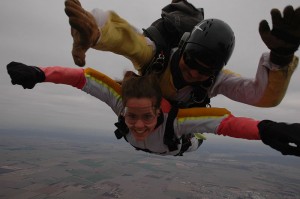Here is an interesting observation posted in a peer reviewed medical journal. It concludes:

Advocates of evidence based medicine have criticised the adoption of interventions evaluated by using only observational data. We think that everyone might benefit if the most radical protagonists of evidence based medicine organised and participated in a double blind, randomised, placebo controlled, crossover trial of the parachute.
So, do we really know if parachutes are better than a placebo for surviving skydiving? Alt-Med advocates are all over this one.


Case in point: homeopathy. http://dangerousintersection.org/2007/08/25/on-ho…
Those who resist "double blind, randomised, placebo controlled, crossover trials" lack the courage of their convictions.
It's amazing how effectively a well-controlled experiment can annihilate false claims. A great example is "facilitated communication." Advocates of FC argue that a helper who held the hand of an autistic child was only "facilitating" the subject's decisions to point to a board filled with symbols, not making the choices for the subject. Thousands of parents and scores of educators had made an cottage industry out of FC techniques and theory.
Yet an extremely simple experiment showed that the facilitators were the ones communicating, not the autistic subjects.
http://www.skepdic.com/facilcom.html
Attached to the above website is a video done by Frontline that terribly damaged the cause of FC. It was rigorous science that also devastated the hopes of parents of autistic children. A deeper question, perhaps, is whether we should EVER be in the business of making people feel good at the expense of the truth.
Failure to adhere to rigorous experimental technique can cause far reaching damage. One of the issues addressed in the above video is whether an accusation of child abuse really came from the child, or whether it was made up by the facilitator. Starting about minute 5 of the following excerpt of this video, you can see that FC was based on not wanting to know, not on "evidence."
<object width="425" height="344"><param name="movie" value="http://www.youtube.com/v/exwGVHk8ME0&hl=en_US&fs=1&"></param><param name="allowFullScreen" value="true"></param><param name="allowscriptaccess" value="always"></param><embed src="http://www.youtube.com/v/exwGVHk8ME0&hl=en_US&fs=1&" type="application/x-shockwave-flash" allowscriptaccess="always" allowfullscreen="true" width="425" height="344"></embed></object>
When I started readin g this post, FC was the first thing that came to my mind.
The problem with FC is known as "operant bias". In many cases the facilitators were not aware that they were communicating in place of the autistic child. They believed they were simply assisting the child. Much like the messages being spelled out on a Ouija board, the facilitators would play out a form of Munchausen syndrome by proxy in subconsciously creating a false endangering environment for the child and casting themselves as heroic protectors.
I've seen this parachute example jokingly used before, and I don't really understand why Alt-Med advocates find it so funny and apt. What they completely miss is that parachutes would outperform placebos and controls in a scientific study. Sure, if you don't have the opportunity to consult research, it may make sense to take a common-sense shot in the dark, but that is typically not the medical reality. Sure, it may be unethical to have a "control" condition in this parachute study, but a quasi-experiment following the outcomes of those who willing or incidentally did not use parachutes would provide a useful (if less statistically rigorous) 'control' condition.